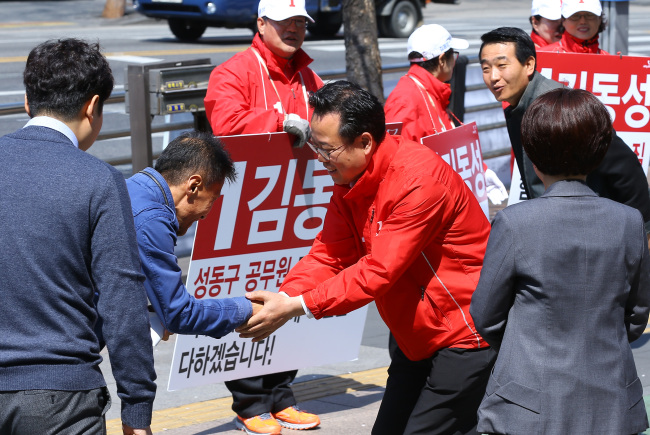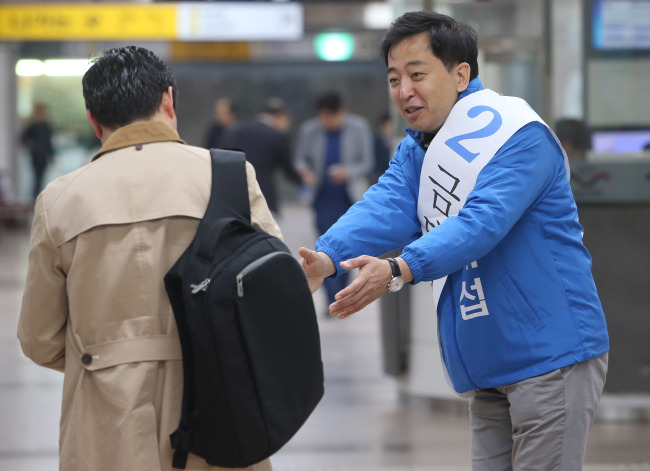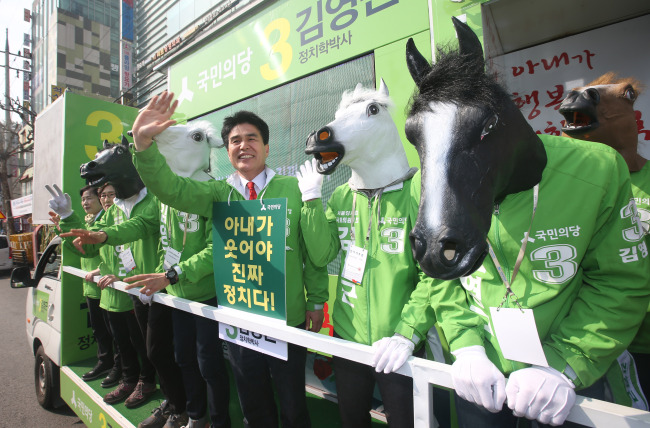Although polling day is just around the corner, neither the ruling party nor the opposition camp seem to have a firm grasp on the election drift, with over a quarter of the nation’s electorate counted as floating voters.
A nationwide public survey conducted by Gallup Korea said last Friday that 27 percent of respondents claimed to be “undecided” as to which party or candidate to vote for in the 20th general elections slated for next Wednesday.
The figure, up 6 percent from December and up 1 percent from last month, showed that voter sentiment turned against political circles during their infighting and division, and continues to stay indifferent despite the imminent elections.
Also, reflecting the public’s resistance to elections, over 2,000 reports were registered at local police stations in the first four days of electioneering, complaining of the noise caused by street campaigning.
The growing number of undecided voters, along with the consequent low voter turnout, is usually a hard blow for the relatively progressive opposition camp.
 |
| Saenuri Party candidate Kim Dong-seong running in Seoul’s Junggu-Seongdonggu-1 district campaigns in front of the district office in Seoul on Wednesday. (Yonhap) |
But this year, the Saenuri Party is also taking the situation seriously, as various reports suggest it is not just the young — potentially more progressive — who are reserving their votes.
According to Gallup Korea’s survey, 23 percent of those aged 60 or more were counted as swing voters, visibly up from the 13 percent late last year. Other surveys similarly indicated that an increasing number of senior citizens have moved over to the politically centrist zone.
The partial breakaway of elderly voters even pushed the conservative party to announce an “emergency” following apprehension that it may not be able to secure the 150 parliamentary majority, much less the original target of 180-200 seats.
It is also amid such background that the ruling party has been highlighting a set of pledges to improve the nation’s economy and to pull up the employment rate, seeking the support of pragmatic centrist voters.
 |
| The Minjoo Party of Korea’s candidate Geum Tae-seop running in Gangseo-1 of Seoul greets passers-by on Wednesday. (Yonhap) |
The Minjoo Party of Korea, which also has to deal with the division of votes caused by the split-off People’s Party, is in no better position.
The survey showed that the ratio of undecided voters among those in their 20s was an unprecedented 43 percent.
 |
| People’s Party candidate Kim Young-geun running in Gangseo-1 district campaigns with his supporters in Seoul on Wednesday.(Yonhap) |
While the fledgling centrist People’s Party is seeking to lure these undecided voters, the Minjoo Party sought for people’s attention by raising the need for government change, lest they should step over to Rep. Ahn Cheol-soo’s middle-of-the-road party.
“I ask voters in the metropolitan areas to carefully judge as to which party is capable of deterring the ruling party’s monopoly and of taking power,” said party chief Kim Chong-in, encouraging citizens to vote for the main opposition party.
“In past elections, the antipathy toward a specific political party led to the upper hand for the rival party, as evident from the backfiring of the conservative camp’s presidential impeachment,” said Shin Yul, professor of politics at Myongji University.
“But over recent years, having witnessed worsening feuds and divisions, people are turning away from politics itself.”
By Bae Hyun-jung (tellme@heraldcorp.com)

